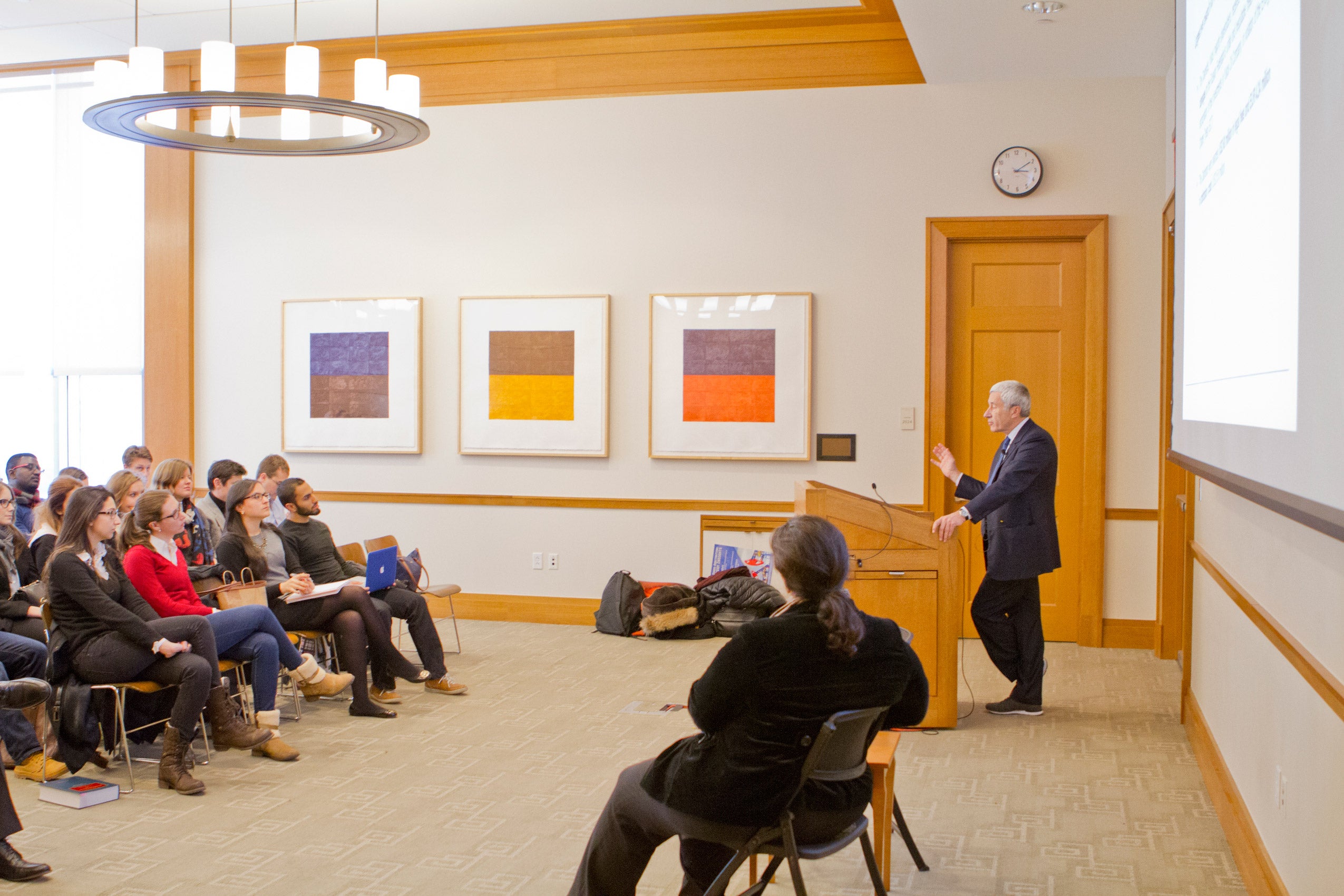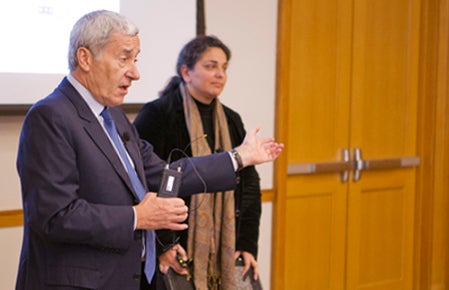Students at Harvard Law School were given a special insider’s view into the case behind the largest arbitration award in history.
In a Feb. 6 talk sponsored by International Legal Studies, the Harvard International Arbitration Law Students Association, and the International Law Journal, Emmanuel Gaillard and Yas Banifatemi LL.M. ’97, head of international arbitration and head of public international law, respectively, at Shearman & Sterling, detailed the intricate story behind securing the historic $50 billion award for the Yukos Oil Cooperative against the Russian Federation.

To put that award in perspective, the second largest arbitral award is $2.47 billion, also secured by Shearman & Sterling, for Dow Chemical Company against Kuwaiti Petrochemical Industries Company.
Following an introduction by Harvard Law School Professor William Alford ’77, Gaillard laid out the background to the case: it began in the fall of 2003, when Russia “launched an attack against Yukos.” Mikhail Khodorkovsky, the chair of Yukos, then the largest oil company in Russia, was arrested at gunpoint and imprisoned. The following spring, Gaillard explained, “the Russian authorities fabricated enormous tax claims against Yukos, about $20 billion,” effectively bankrupting the company and forcing it into state control. The majority stakeholders of Yukos were convinced that it had been a takeover for political reasons, and that they should be compensated for their losses.
Would Gaillard consider their case against the Russian Federation? Digging in for a fight against their formidable opponent, Gaillard and Banifatemi sent a “trigger letter” at the end of 2004, stating that Russia had violated the Energy Charter Treaty (ECT), a multinational treaty that establishes a legal framework for long term cooperation in the energy sector, by not compensating investors after the takeover. The Yukos stakeholders, they argued, were entitled to $114 billion.
Banifatemi began her description of the jurisdictional aspect of the case by laying out the timeline, explaining that each stage took approximately five years, with a hearing at the end of each of the five-year periods.
The first hearing examined whether Russia was bound by the ECT, with the Shearman & Sterling team arguing that even though Russia had not ratified the treaty, Russia had accepted the provisional application and, until formal ratification, would apply it to the extent that it aligned with Russia’s own laws. “Everyone told us we were insane to start an action against Russia based on a non-ratified treaty. We were comfortable, because this was a treaty-law mechanism that is provided for in the Vienna convention on the law of treaties, and it is also a treaty mechanism under Russian law. So we had to argue that both international law and Russian law ensure that the provisional application treaty is accepted.” The tribunal agreed, ruling Russia was bound by the treaty.
Banifatemi then detailed the highly complex issues central to the second hearing, two articles within the treaty that regarded trust law (Article 17) and tax law (Article 21). The tribunal was convinced on both parts: Russia could not deny benefits to the claimants under Article 17; they were protected under the treaty, and that Article 21, which prohibits tax claims from being arbitrated under the treaty, did not apply to the case as the taxes were issued falsely, with the sole intent of bankrupting Yukos.
Ten years, 37 days of hearings, 6,500 pages of court submissions, 11,000 exhibits, and 3,300 pages of hearing transcripts later, the arbitral tribunal sitting in The Hague under the auspices of the Permanent Court of Arbitration delivered its ruling. On July 18, 2014, the tribunal ruled that “Yukos was the object of a series of politically-motivated attacks by the Russian authorities that eventually led to its destruction,” with the Russian Federation’s intent being “to bankrupt Yukos, assign its assets to a state-controlled company, and incarcerate [Khodorkovsky] who gave signs of becoming a political competitor.”
The Russian Federation was also ordered to reimburse the Yukos stakeholders for 75% of their legal fees: $60 million.
Following their in-depth discussion of the case, Gaillard and Banifatemi took questions from the audience. Responding to a query regarding the amount of taxes levied upon Yukos, Banifatemi noted “It’s not only a question of amount, it’s also the way it was implemented. If you are a bona fide tax authority you make sure that you are paid. What Russia did was make sure that it was not paid.” with Gaillard adding, “You can make a mistake. You cannot do it on purpose.”
When asked about the expectations of actually obtaining the award and the legal ramifications of the now-passed January 15 payment deadline, Gaillard said, “The clients are open to negotiation and [possible] settlement. [Enforcement] is typically very hard. Against a private party you [can] freeze their bank accounts; states have all sorts of immunities and it takes time.” He noted that “their interest is $2.6 million a day.”
Harvard Law School Assistant Professor Mark Wu wrapped up the afternoon by thanking Gaillard and Banifatemi, commenting, “This … story not only confounds those who say that international law does not matter or that powerful states are immune from suits for violating international investment treaties, but it also shows the extraordinary tenacity of the people involved in shaping international law.”
